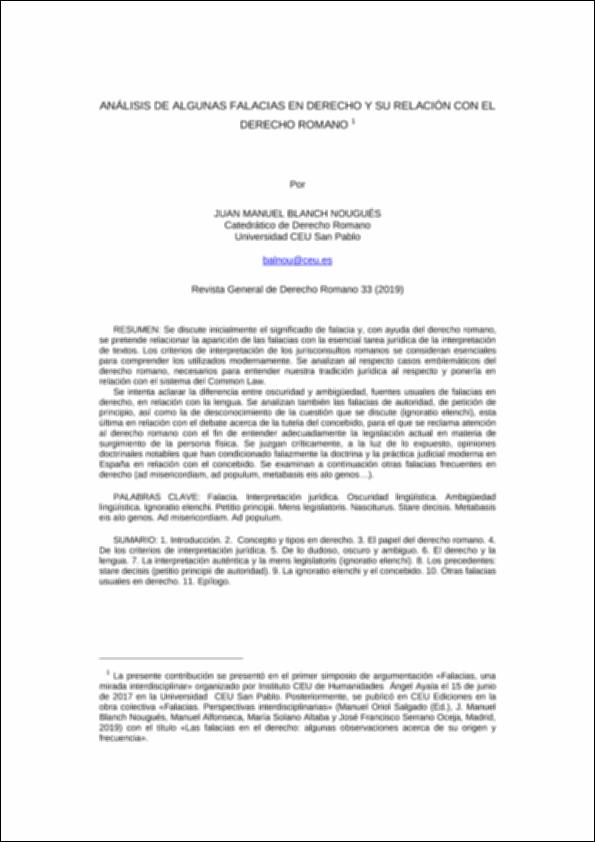Please use this identifier to cite or link to this item:
http://hdl.handle.net/10637/14102Análisis de algunas falacias en derecho y su relación con el derecho romano
| Title: | Análisis de algunas falacias en derecho y su relación con el derecho romano |
| Authors : | Blanch Nougués, Juan Manuel |
| Keywords: | Falacia; Interpretación jurídica; Oscuridad lingüística; Ambigüedad lingüística; Ignoratio elenchi; Petitio principii; Mens legislatoris; Nasciturus; Stare decisis; Metabasis eis alo genos; Ad misericordiam; Ad populum |
| Abstract: | Se discute inicialmente el significado de falacia y, con ayuda del derecho romano,
se pretende relacionar la aparición de las falacias con la esencial tarea jurídica de la interpretación
de textos. Los criterios de interpretación de los jurisconsultos romanos se consideran esenciales
para comprender los utilizados modernamente. Se analizan al respecto casos emblemáticos del
derecho romano, necesarios para entender nuestra tradición jurídica al respecto y ponerla en
relación con el sistema del Common Law.
Se intenta aclarar la diferencia entre oscuridad y ambigüedad, fuentes usuales de falacias en
derecho, en relación con la lengua. Se analizan también las falacias de autoridad, de petición de
principio, así como la de desconocimiento de la cuestión que se discute (ignoratio elenchi), esta
última en relación con el debate acerca de la tutela del concebido, para el que se reclama atención
al derecho romano con el fin de entender adecuadamente la legislación actual en materia de
surgimiento de la persona física. Se juzgan críticamente, a la luz de lo expuesto, opiniones
doctrinales notables que han condicionado falazmente la doctrina y la práctica judicial moderna en
España en relación con el concebido. Se examinan a continuación otras falacias frecuentes en
derecho (ad misericordiam, ad populum, metabasis eis alo genos…). The meaning of fallacy is initially discussed, and, with the help of Roman law, it is intended to relate the frequency of fallacies in law with the essential legal task of interpreting texts. The interpretative criteria of Roman jurisconsults must be considered essential to understand those used in modern times. In this regard, emblematic cases of Roman law are analyzed because they are judged necessary to understand our legal tradition in this respect and to put it in relation with the Common Law system. It is intended to clarify the difference between darkness and ambiguity, usual sources of fallacies in law, in relation to language. The fallacies of authority, question‒begging, as well as ignoratio elenchi are also analyzed; the latter in relation to the debate about the protection of the unborn baby, with the help of Roman law, in order to properly understand the current legislation on individuals. It is critically judged, considering the questions dealt with above, the doctrine that has fallaciously conditioned the modern legal literature and judicial practice in Spain in relation to the unborn babies. Besides, other frequent fallacies in law are examined (ad misericordiam, ad populum, metabasis eis alo genos...). |
| Description: | En: Revista General de Derecho Romano. 1697-3046 n. 33, [32 p.] |
| URI: | http://hdl.handle.net/10637/14102 |
| Rights : | http://creativecommons.org/licenses/by-nc-nd/4.0/deed.es |
| Issue Date: | 1-Dec-2019 |
| Center : | Universidad San Pablo-CEU |
| Appears in Collections: | Facultad de Derecho |
Items in DSpace are protected by copyright, with all rights reserved, unless otherwise indicated.


